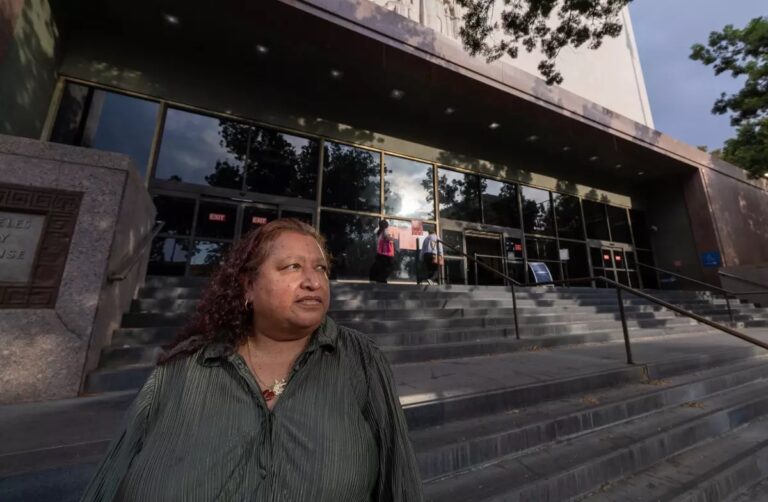The ambitious plan to give every tenant in LA a lawyer to fight eviction
More Of This
In a bustling hallway on the sixth floor of a downtown courthouse, Alcira Ayala sat on a bench with her husband and daughter, anxiously waiting for her eviction case to be called. She held a black cloth bag filled with neatly organized records that she hoped would help her win her case and stay in the apartment that she and her family have lived in for nearly two decades.
Since learning this summer that her landlord wanted to evict them, Ayala had spent days calling and showing up at the offices of local nonprofit groups to ask for help.
She had hoped to get a free lawyer, but quickly learned that there aren’t enough in the city to represent everyone who needs help. To try to defend herself, she went to the L.A. Law Library to ask for guidance filing the legally required response to the notice. Then, she attended hours of online training hosted by the nonprofit Eviction Defense Network, which teaches tenants without lawyers how to prepare for court.
Read the rest on LA Times
The conservative legal movement doesn’t want Black women in positions of power
Stay Vigilant
Of the hundreds of billions of dollars in venture capital funds raised by American companies in recent years, less than one percent of that money has been allocated to businesses owned by Black women. When Black women ask VC funders for capital, they usually get told no. And on the off-chance they’re told yes, they usually get much less than they asked for: The 2021 Small Business Credit Survey showed that only 13 percent of Black-owned firms got all of the funding they requested, compared to 40 percent of white-owned firms. And 46 percent of Black-owned firms received nothing.
The level of startup capital a business has directly shapes its ability to succeed. Even though companies with more gender and ethnic diversity among their founders achieve 30 percent higher returns for investors than those founded by white men, diverse companies receive less than half as much funding as white guys’ companies, according to research conducted by McKinsey & Company. The denial of access to investment funds holds Black women and their businesses back: Only three percent of businesses owned by Black women survive past five years.
Read the rest on Balls & Strikes
How a once-moderate Justice John Roberts got red-pilled
Less Of This

It would appear that the chief justice of the Supreme Court of the United States, John Roberts, has been fully captured by the cult of Donald Trump. An article by Jodi Kantor and Adam Liptak in Sunday’s New York Times details how Roberts has been spending his time putting his heavy thumb on the scales to help Trump accomplish his legal and political goals. What it reveals is that Roberts wanted to make sure Trump could run in this election, wanted to make sure Trump escaped accountability for his many crimes, and wanted to grant Trump unprecedented immunity to commit additional crimes should he be returned to office.
Roberts accomplished this through three key cases, all of which the court heard in the last term, and all of which Kantor and Liptak break down with careful detail. Their reporting shows how Roberts abandoned a moderate, consensus-building approach in his decision to ignore valid 14th Amendment objections to Trump’s eligibility to run for office and instead opted for a more controversial and conservative ruling that sparked a fractured concurrence from the women on the Supreme Court.
Read the rest on The Nation
Autocracy wins by capturing the courts
Speaking Of...
In authoritarian states, the public has no agency and no real access to justice. In the second episode of Autocracy in America, a new five-part series about authoritarian tactics already at work in the United States, hosts Anne Applebaum and Peter Pomerantsev examine the case of Renée DiResta, a scholar who researches online information campaigns, who struggled to counter false accusations leveled against her after a series of courts accepted them without investigation. And they discuss how recent Supreme Court decisions raise a broader issue of legitimacy: As courts become more political, people could begin to assume justice is impossible.
Listen to the podcast on The Atlantic












